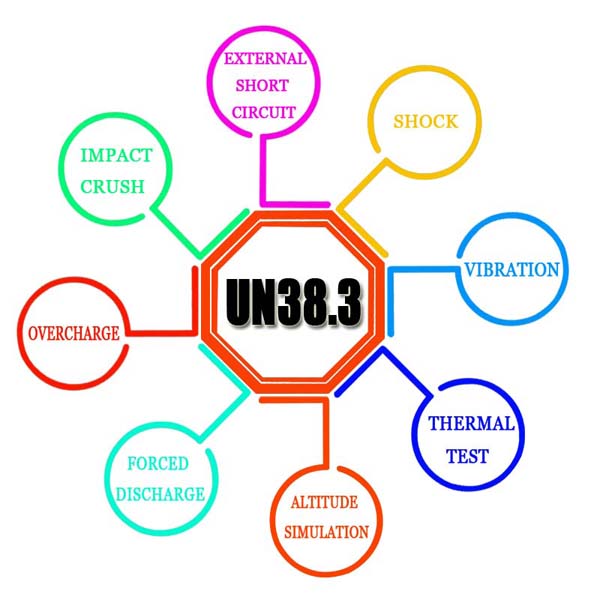What is UN38.3? UN38.3 testing plays a vital role in ensuring the safety and compliance of battery-powered products. This article explores the significance of UN38.3 testing, its classification, procedures, and why it’s essential for product safety and compliance.
Part 1. What is UN38.3?
UN38.3, short for “United Nations Manual of Tests and Criteria, Part III: Section 38.3,” is an international standard for the testing and transporting of lithium-ion batteries. It outlines the procedures and requirements for assessing the safety of lithium-ion batteries, which are commonly used in various electronic devices such as smartphones, laptops, and electric vehicles.
This standard covers a range of tests designed to evaluate the performance and safety of lithium-ion batteries under different conditions, including mechanical abuse, thermal abuse, and electrical abuse. These tests simulate various real-world scenarios to ensure that batteries can withstand everyday use and unforeseen circumstances without posing a risk of fire, explosion, or other hazards.
Part 2. UN 38.3 classification
UN 38.3 classification categorizes lithium-ion batteries based on their type or mode of transportation, ensuring adherence to safety and compliance standards. Here are the key classifications:
By Battery Type
Lithium Metal Batteries (UN 3090): These batteries contain metallic lithium and are typically used in devices like watches and calculators. They undergo specific testing and packaging requirements for safe transportation.
Lithium Ion Batteries (UN 3480): These batteries utilize lithium ions for energy storage and power various consumer electronics like smartphones and laptops. They must meet stringent testing criteria to ensure safe handling and transport.
Lithium Ion Batteries Contained in Equipment (UN 3481): Batteries installed in or packed with equipment, such as power tools or medical devices, fall under this classification. They require compliance with UN 38.3 standards to ensure safety during transportation.
By Transportation Mode
Ground Transportation (UN38.3.1): Batteries intended for ground transport undergo testing to ensure safety during transit by road or rail. This includes assessments of packaging, labeling, and handling procedures.
Air Transportation (UN38.3.2): Batteries designated for air transport must meet stringent testing requirements due to the heightened risks associated with air travel. Compliance is crucial to prevent incidents during air transit.
Sea Transportation (UN38.3.3): Batteries transported by sea undergo testing to mitigate risks such as fire, explosion, or leakage, which could pose environmental hazards. Compliance with UN 38.3 standards ensures safe handling and transport via sea routes.
Part 3. UN38.3 testing procedures

UN38.3 testing procedures encompass a series of rigorous assessments to ensure the safety and compliance of lithium-ion batteries. Here are the key steps :
Mechanical Shock Test
- Batteries are subjected to controlled impacts to simulate situations like drops or collisions during transportation.
- This test evaluates the battery’s ability to withstand mechanical stress without causing damage or releasing hazardous materials.
Thermal Test
- Batteries are exposed to extreme high and low temperatures to assess their performance under different climatic conditions.
- The goal is to ensure that batteries remain stable and functional within specified temperature ranges without overheating or freezing.
Vibration Test
- Batteries undergo vibration testing to simulate conditions experienced during transportation, such as road or rail transit.
- This test measures the battery’s resistance to mechanical stress and assesses its structural integrity under vibrational forces.
Overcharge Test
- Batteries are intentionally overcharged to assess their response to excessive charging conditions.
- This test aims to identify potential risks of thermal runaway or other safety hazards during overcharging.
Short Circuit Test
- Batteries are subjected to short-circuit conditions to evaluate their ability to safely handle internal or external short circuits.
- The test assesses the battery’s response to short-circuit events. It verifies that it can prevent thermal runaway or other dangerous outcomes.
Crush Test
- Batteries are crushed or deformed under controlled conditions to assess their structural integrity and safety features.
- This test helps identify potential deformation, leakage, or rupture risks under compressive forces.
Impact Test
- A specified force impacts batteries to evaluate their resistance to impact-related damage.
- The test assesses the battery’s ability to withstand impact forces without compromising its safety or performance.
Altitude Simulation Test
- Batteries are subjected to changes in atmospheric pressure to simulate conditions experienced during air transportation.
- This test evaluates the battery’s response to altitude changes and ensures its safety during air transit.
Part 4. Why is UN38.3 testing necessary?
Ensuring Safety
UN38.3 testing is crucial for verifying the safety of lithium-ion batteries, which are commonly used in various electronic devices. By subjecting batteries to rigorous testing procedures, potential hazards such as thermal runaway, fire, or explosion can be identified and mitigated, ensuring the safety of users and property.
Compliance with Regulations
Many countries and international organizations require compliance with UN38.3 testing standards for transporting lithium-ion batteries. Adhering to these regulations is essential for businesses to avoid legal consequences, fines, or product recalls resulting from non-compliance.
Protecting the Environment
Proper testing and certification of lithium-ion batteries help prevent environmental damage caused by battery-related incidents such as fires or leaks. Ensuring batteries meet UN38.3 standards significantly reduces the risk of environmental contamination from hazardous materials.
Building Consumer Trust
Consumers expect the products they purchase to be safe and reliable. UN38.3 testing provides a standardized method for assessing battery safety. It guarantees consumers that their products have undergone thorough testing and meet established safety standards.
Preventing Accidents during Transportation
Lithium-ion batteries pose unique risks during transportation due to their chemical composition and energy density. UN38.3 testing helps identify potential hazards and ensures batteries are packaged and handled safely to prevent accidents such as fires or explosions during transit.
Reducing Liability Risks
Non-compliance with safety regulations can expose businesses to liability risks in the event of accidents or injuries caused by unsafe products. UN38.3 testing helps mitigate these risks by identifying and addressing potential safety hazards before products reach the market.
Part 5. FAQs
-
Is UN38.3 mandatory?
Yes, UN38.3 is mandatory for transporting lithium batteries. -
How long does UN38.3 take?
UN38.3 testing duration varies but typically takes several weeks to complete. -
What is the difference between MSDS and UN38.3?
MSDS provides material safety information, while UN38.3 focuses on battery transportation safety. -
What is the purpose of UN38.3?
UN38.3 ensures lithium battery safety during transportation. -
What is the difference between UN38.3 and IEC62133?
UN38.3 covers transportation safety, while IEC 62133 focuses on battery safety standards.
Related Tags:
More Articles

Overview of Deep Cycle Lithium Battery
In this article, we explore the life, voltage, capacity, and charging considerations of deep cycle lithium batteries.
How Long do Lithium Batteries Last?
How long do lithium batteries last? we will explore the factors that influence the lifespan of lithium batteries and provide insights into their longevity.
How to Choose the Best LiFePO4 Battery?
Choose LiFePO4 batteries for superior performance, safety, and versatility in EVs, UPS, and backup power. This guide helps you make informed decisions.
Get 12v Lithium Car Battery As a Power Source for the Ride
Make the right choice for your vehicle's battery needs by installing a 12 volt lithium car battery. You will enjoy maintenance-free longevity with this change.
Everything About A Small Lithium Ion Battery
Discover the features, uses & future potential of a small lithium ion battery. A compact and tiny powerhouse ideal for smartphones, wearables, drones & more.





